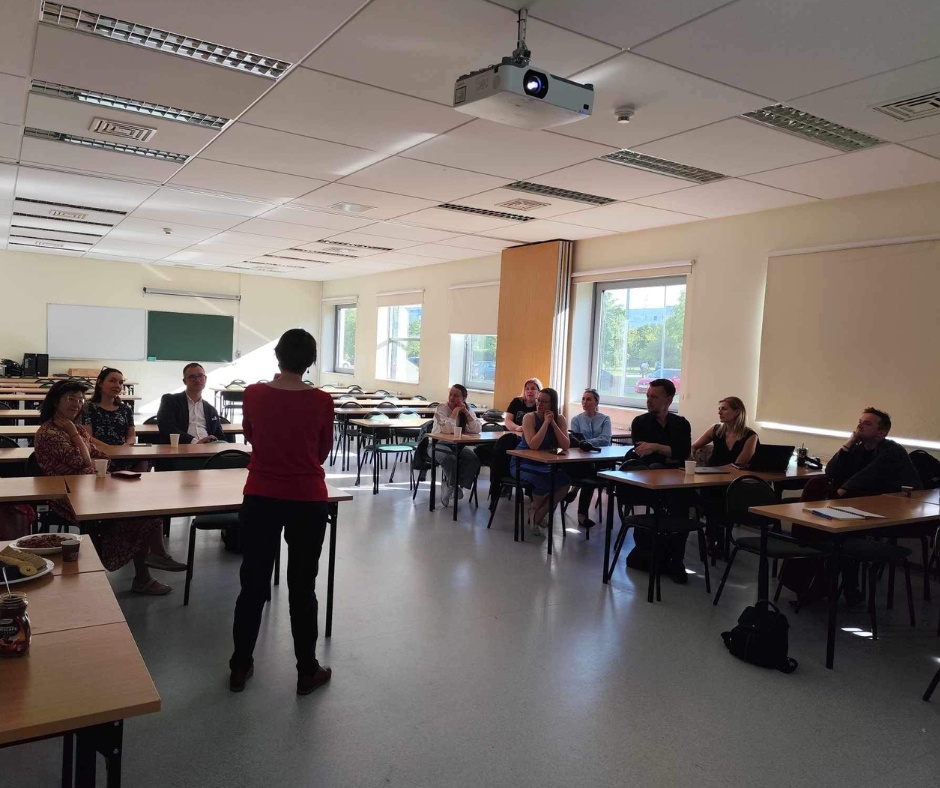We have concluded the summary workshops of the intervention meetings organized as part of the project “Increasing Migrants’ Access to Information about Vaccines in the Tri-City Area,” funded by the National Agency for Academic Exchange Intervention Grants program.
The summary meeting of the interventions with migrants (conducted in February and March 2024) was led by dr Elżbieta Czapka (project coordinator). In addition to migrant ambassadors who recruited participants for the project and doctors serving as experts in the project, the workshop included the project team (dr Irena Chawrilska, dr Weronika Kamińska-Skrzyńska, Prof. Łukasz Balwicki). Researchers from the Pandemic Center at the Alrek Health Cluster in Bergen, Professor Esperanza Diaz – the Director of the Center, and Marta-Johanna Svendsen, also shared their experiences.
During the workshops, the effects of the interventions were discussed. It turns out that some project participants benefited from medical assistance thanks to the information obtained during the meetings at the University of Gdańsk.
“The project demonstrated that access to medical information from a reliable source, in our case the wonderful and dedicated doctors, facilitates making informed decisions about one’s own health. We know that many participants of our meetings registered themselves and their children for vaccinations,” points out dr Elżbieta Czapka, the project coordinator.
“Collaboration between academia and migrants in times of crises is possible and gives both the migrants and society at large many benefits. However, the dialogue among the academic environments and civil society must be based on trust and nurtured in times of peace. Furthermore, the common aim of the dialogue should be the development of equitable health care services, and careful evaluation of projects as the Health ambassador will help us reflect about better solutions in health care provision for all citizens at all times,” says Professor Esperanza Diaz.
The project “Increasing Migrants’ Access to Information about Vaccines in the Tri-City Area”
The project titled “Increasing Migrants’ Access to Information about Vaccines in the Tri-City Area” is funded by the National Agency for Academic Exchange under the Intervention Grants program. The grant is being implemented by dr Elżbieta Czapka (University of Gdańsk), dr Weronika Kamińska-Skrzyńska (Medical University of Gdańsk), dr Irena Chawrilska (University of Gdańsk), and Jolanta Mrozek-Kwiatkowska (University of Gdańsk) in close collaboration with a team of researchers from the Pandemic Center based at the Alrek Health Cluster in Bergen (Professor Esperanza Diaz – Director of the Center, Marta-Johanna Svendsen, and Andrea Magugliani).
The project involves research activities that, due to the need for rapid response, cannot be implemented through other existing funding mechanisms. It addresses the issue of access to vaccination information among refugees, differences in vaccination schedules, low enforceability of vaccination obligations, and the growing activity of anti-vaccination movements. Knowledge, questions raised, and collective clarification of doubts regarding vaccinations can potentially influence the sense of collective responsibility for public health in Poland, benefiting both immigrants and all residents of Poland.
As part of the project, educational and engagement activities are being carried out in an international partnership, consisting of three stages:
- Diagnosis – including discussions of social challenges related to the pandemic, preparation of diagnostic and educational-consultative materials.
- Intervention and Inclusion – involving the monitoring of inviting other immigrants, organizing, and conducting interventions.
- Evaluation in the Tri-City area – including conducting structured in-depth interviews and analysis of results, and preparing recommendations.
The project will conclude on July 3, 2024.


